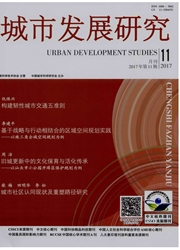

 中文摘要:
中文摘要:
随着城市化进程的不断推进,北京市城市经济快速发展的需求与环境的保护、资源的可持续利用已成为城市发展的主要矛盾,空气污染、水资源紧缺、交通、住房压力大等问题非常突出面对这种情况,必须坚持科学发展观,努力实现人口、经济、环境和能源等因素的协调发展结合城市可持续发展的内涵和北京市的城市发展现状,采用驱动力-压力-状态-影响-响应(driving-forces-pressure-state-impact-response, DPSIR )理论框架构建城市可持续发展综合评价指标体系,将墒值法和层次分析法相结合合理确定指标权重选取了2001-2014年北京市城市发展指标数据,从驱动力、压力、状态、影响、响应等5个方面,对北京市可持续发展水平进行系统评估和分析,识别关键因素和重要环节,并提出建议和措施,为实现和优化北京市经济、社会和环境的可持续发展提供指导和支持。
 英文摘要:
英文摘要:
With the development of urbanization, the contradiction between rapid urban economic development and environmental protection, sustainable use of resources has become a major obstacle to the urban development of Beijing. Air pollution, water shortages, transportation, housing and other issues arc becoming prominent. Faced with this situation, we must adhere to the scientific concept of development and make great efforts to achieve coordinated development of population, economy, environment and energy in Beijing. In this paper, taking into account boith the connotation of sustainable urban development and the present situation of urban development in Beijing, the driving-forces-pressure-state-impact-response (DPSIR) theoretical framework is used to build a comprehensive evaluation index system of sustainable urban development, and the entropy method and AHP are combined to obtain the reasonable index weights. Based on the above cstablisbed evaluation system, the level of sustainable urban development of Beijing is evaluated and analyzed using the 2001-2014 evaluation index data of Beijing from the five aspects of driving forces, pressure, state, impact, response. Furthermore, the key factors in achieving Beijing's sustainable development are identified and the relevant recommendations arc proposed. The research results in this paper will shed a light on the implementation and optimization of Beijing's economic, social and environmental sustainability in the long tenn.
 同期刊论文项目
同期刊论文项目
 同项目期刊论文
同项目期刊论文
 期刊信息
期刊信息
